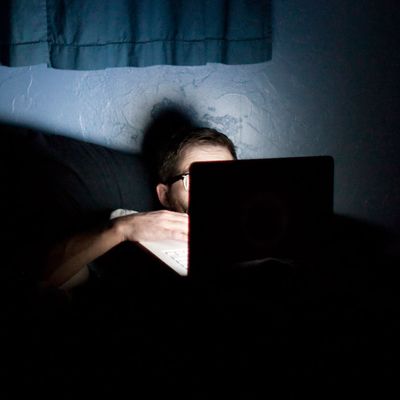
Pornography fears are probably never going away. Porn evokes such fear and such disgust that some people are convinced it is doing tremendous harm to the literally billions of people who consume it. That doesn’t mean, of course, that it’s impossible porn has negative effects in some circumstances. What it does mean is that, as with any research finding dealing on a hot-button issue, we should be skeptical and should make sure we understand the limits of what a given study is and isn’t claiming.
Take the newest skirmish in the porn wars: research presented at the recent annual meeting of the American Sociological Association which appears to show a link between porn use and divorce.
Elizabeth Nolan Brown has a good rundown at Reason:
Led by Samuel Perry, an assistant professor of sociology at the University of Oklahoma, the researchers discovered that beginning to watch porn between survey waves was associated with an increased likelihood of getting divorced by the next survey period, compared to couples who said they never watched porn. Overall, “beginning pornography use between survey waves nearly doubled one’s likelihood of being divorced by the next survey period, from 6 percent to 11 percent, and nearly tripled it for women, from 6 percent to 16 percent,” said Perry.
As Brown explains, you can’t look at the porn/no porn question in a vaccuum. There are a lot of potential moderating factors. “Perhaps for those who don’t watch porn when they first get married, taking up the habit signals something going wrong in the relationship—a lack of sexual satisfaction, more time being spent alone, etc.,” she writes. Or maybe people already predisposed to watching porn “are in general, somewhat more likely than those who don’t to struggle with monogamy, value sexual variety, eschew strict religious rules on sex and marriage, or possess some other trait that could cause a higher likelihood to divorce.”
Sure enough, Perry found evidence to suggest that some of these factors moderated the link between porn and divorce, as social scientists put it — that is, affected the strength of the connection. This — and the general norms of academic writing — accounted for Perry’s cautious phrasing: “viewing pornography, under certain social conditions, may have negative effects on marital stability.”
The study in question hasn’t been peer-reviewed yet, but once it has been reviewed and published, there will, of course, be a temptation for those covering it to read it as though the paper were projecting “PORN = DIVORCE” onto a wall in hundred-foot-tall letters.
But the idea of moderators is absolutely key, both here and more generally. Both journalists and the PR folks responsible for disseminating new research via press release have a tendency to push “X causes Y” stories. It’s an understandable tendency given that all else being equal, human beings prefer straightforward stories to nuanced ones, but it gives rise to a lot of undercooked coverage of social science. Most of the interesting stories in social science aren’t “X causes Y,” but that “X has a complicated relationship with Y, and may be correlated with it in important ways depending on A, B, C, D, and E.” Porn is probably no different.




